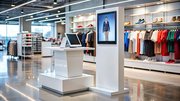Blog
In the blink of an eye ...
November 3, 2011 by Jeff Weidauer — Vice President, Marketing & Strategy, Vestcom International, Inc.
It's no secret that supermarkets spend literally hundreds of millions of dollars on advertising. They spend money on television, radio, print, email, online, mobile, and just about anything else you can think of to broadcast their message and create demand.
Research tells us that word-of-mouth advertising is the most effective; this is messaging that can't be bought, except by providing some service or value that is exceptional enough to cause a customer to tell a friend or two. In today's world, that likely means posting it on Facebook as opposed to a conversation over the mythical back fence. But the point is that a peer recommendation is always better than an ad.
When I was coming up through the ranks in stores, we had a district manager who understood this perfectly. While most of our operations folks had a tendency to be focused on shrink and labor hours, he thought about how to use shopper engagements to create greater loyalty. One of his favorite examples was that of a customer who brought back a sour gallon of milk.
The standard response would be to question the customer: did she leave it out of refrigeration? And why is it half empty? This particular D.M.'s response: give her two good ones. He truly got it.
But there is something about retail that makes the people working in stores into part-time detectives. They worry about shoplifters and follow "suspicious" people around to make sure they aren't stealing anything. True, shoplifting is a major problem in retail today, and getting worse. But it's a well-known fact that most losses at retail are from employees; the rest are from experienced gangs who the store personnel would never suspect.
The problem of employees worrying about—and attempting to apprehend—shoplifters got so bad that my company instituted a no-tolerance policy. This was the result of a rash of injuries from employees chasing suspected shoplifters outside the store and getting stabbed, beaten or worse in the process. The losses in worker's comp, productivity, etc. far outweighed the value of the product.
All this came back to me when I read an article about the couple that was detained and arrested for "stealing" five dollars worth of sandwiches while shopping at a store in Honolulu. The couple's daughter, who turns 3 in December, was taken from them for the night while they dealt with the authorities. Whether the non-payment for the sandwich was on purpose or not, the resulting debacle has cost Safeway millions in goodwill and loyalty.
This all because some over-zealous store person decided to make an example of a pregnant woman (and based on her $50 pre-arrest purchase, a good customer). Those hundreds of millions of advertising dollars spent are for naught, and all in the blink of an eye.
 ChatGPT
ChatGPT Grok
Grok Perplexity
Perplexity Claude
Claude




